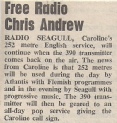© 2014-


Radio Seagull - History
1973
On the MV Mi Amigo non-
DJs from the former Radio Caroline (which had last broadcast in March1973) had been pressing Ronan O'Rahilly to reintroduce an English language service from the Mi Amigo in addition to the Flemish output from Radio Atlantis. This eventually occurred at 9.00pm on 24th July 1973 when the start of a new English language station -
This new station was to broadcast 'progressive' music on 388m throughout the night until an hour before Radio Atlantis began its transmissions at 6.00am the following morning. The name Radio Seagull, as well as having nautical overtones, was derived from the title of a contemporary cult book by Richard Bach "Jonathan Livingston Seagull" about experimenting in freedom. The concept and format for Radio Seagull grew out of the land-
The introduction of an English language service from the Mi Amigo was welcomed, but the format and progressive music content did not appeal to everyone -
Radio Seagull with its 'progressive' music format was perceived as the ideal solution to competing demands -
Radio Seagull's service continued during the summer of 1973 although it was somewhat disorganised in presentation style and the music played was largely obscure album based material, described generically as 'progressive'. The station also started promoting the idea of love, peace and happiness -
As the summer continued Radio Seagull became steadily more directionless and lacking in a definite music policy. It was only after two DJs who had been involved in the 1970 (legal, landbased) progressive music station, Radio Geronimo joined Radio Seagull. Hugh Nolan and Barry Everett, became the dominant influence on Radio Seagull for the remainder of its time on the air during 1973, but their music choice was often very obscure, holding little interest or appeal for a mass market audience.
At the end of September 1973 the MV Mi Amigo was battered by severe storms and during the early morning of 1st October the recently constructed lattice frame aerial mast collapsed. Engineers hurriedly rigged up a temporary aerial by attaching wires between the remains of the original structure and the mast at the stern of the radio ship. Using only the 10Kw transmitter broadcasts of Radio Atlantis and Radio Seagull were able to start once again on 4th October, but signal strength was poor and reception for listeners was far from satisfactory and on 18th October the temporary aerial system failed completely.
1974
Radio Seagull returns
Radio Seagull was reintroduced on 7th January 1974 at 9.00pm following the closure of Radio Mi Amigo's broadcasts. It was rumoured that ex- some funding to help re-
some funding to help re-
This time, however, the station was to be differently organised and far more professional. Radio Seagull began to attract a significant specialist audience, but without any prior announcement on 23rd February 1974, the broadcasts began as usual at 9.00pm but under the call sign Radio Caroline.
However, regular listeners were not too concerned about the change of name because the progressive music of Radio Seagull was continued with the format becoming more and more based on album tracks rather than singles.


Click on picture to enlarge

Disc
18th August 1973

Record and Radio Mirror
12th January 1974

Disc
19th January 1974

Record and Radio Mirror
13th October 1973
Opening night, 24th July 1973, Andy Archer

Station ID and programme run-

Re-
7th January 1974





History
Key Dates
Ship and Location
Technical
Staff
Programmes









Back to Britain Gallery


Back to Netherlands/Belgium Gallery


Back to Radio Seagull
